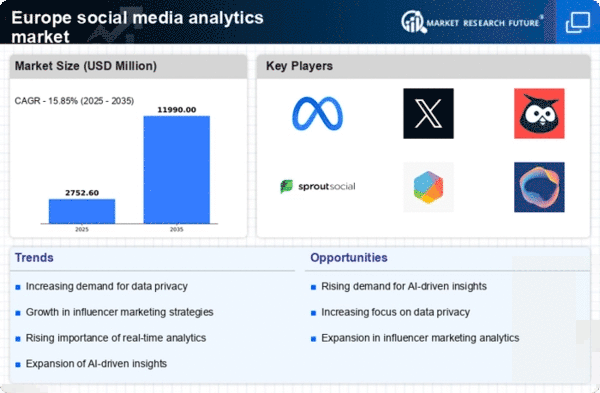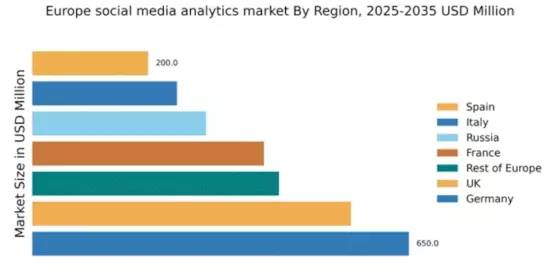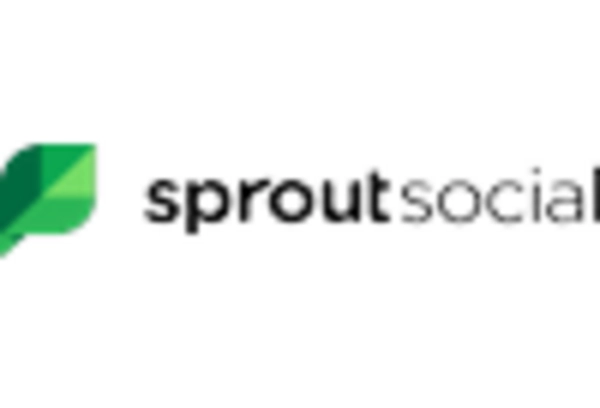Emergence of Influencer Marketing
The emergence of influencer marketing significantly shapes the social media-analytics market in Europe. Brands are increasingly collaborating with influencers to reach targeted audiences effectively. In 2025, it is projected that influencer marketing expenditures will surpass €10 billion across Europe, highlighting the growing reliance on social media analytics to measure campaign effectiveness. Companies are utilizing analytics tools to assess influencer performance, audience engagement, and return on investment (ROI). This data-driven approach enables brands to refine their influencer strategies, ensuring that they align with their overall marketing objectives. As the influencer marketing landscape evolves, the demand for sophisticated analytics solutions that can provide insights into campaign performance is likely to increase, further propelling the market.
Rising Demand for Data-Driven Insights
The social media analytics market in Europe experiences a notable surge in demand for data-driven insights. Businesses increasingly recognize the value of leveraging social media data to inform strategic decisions. In 2025, it is estimated that the market will reach approximately €3 billion, reflecting a compound annual growth rate (CAGR) of around 15% from previous years. This growth is driven by the need for organizations to understand consumer behavior and preferences, enabling them to tailor their marketing strategies effectively. As companies strive to enhance customer engagement and brand loyalty, the reliance on social media analytics becomes paramount. The ability to extract actionable insights from vast amounts of data positions businesses to stay competitive in a rapidly evolving digital landscape.
Regulatory Compliance and Data Governance
The social media analytics market in Europe is increasingly influenced by regulatory compliance and data governance requirements. With the implementation of stringent data protection regulations, such as the General Data Protection Regulation (GDPR), businesses must ensure that their analytics practices adhere to legal standards. In 2025, it is anticipated that compliance-related investments will account for approximately 20% of total analytics spending in Europe. This focus on regulatory compliance necessitates the development of analytics solutions that prioritize data privacy and security. Companies are seeking tools that not only provide insights but also ensure that data collection and processing practices align with legal frameworks. As organizations navigate the complexities of data governance, the demand for compliant social media analytics solutions is likely to grow, shaping the market landscape.
Expansion of E-Commerce and Digital Marketing
The social media-analytics market in Europe is significantly influenced by the expansion of e-commerce and digital marketing initiatives. As online shopping continues to gain traction, businesses are increasingly utilizing social media platforms to reach potential customers. In 2025, e-commerce sales in Europe are projected to exceed €800 billion, prompting companies to invest in analytics tools that can optimize their social media marketing efforts. This trend indicates a growing recognition of the importance of understanding customer interactions on social media to drive sales. By analyzing consumer engagement and sentiment, businesses can refine their marketing strategies, ultimately leading to improved conversion rates and customer satisfaction. The integration of social media analytics into e-commerce strategies is likely to become a standard practice, further propelling market growth.
Increased Focus on Brand Reputation Management
In the current landscape, the social media-analytics market in Europe is witnessing an increased focus on brand reputation management. Companies are becoming more aware of the impact that social media can have on their public image. In 2025, it is estimated that around 70% of consumers will rely on social media reviews and feedback when making purchasing decisions. This statistic underscores the necessity for businesses to monitor their online presence actively. By utilizing social media analytics tools, organizations can track brand mentions, sentiment, and customer feedback in real-time. This proactive approach allows companies to address potential issues swiftly, thereby safeguarding their reputation. As the importance of brand perception continues to grow, the demand for effective social media analytics solutions is likely to rise, driving market expansion.

















